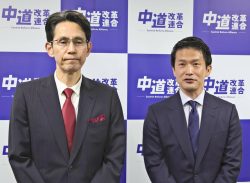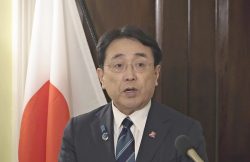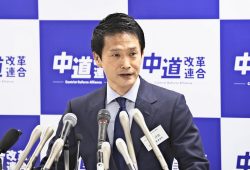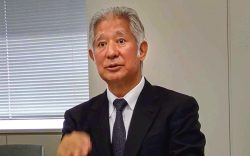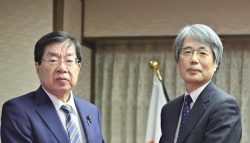
Prime Minister’s Office
11:10 JST, February 22, 2024
Tokyo (Jiji Press)—The Japanese government has adopted plans to create a new system designed to train unskilled foreign workers and facilitate their attainment of medium- to long-term employment opportunities in Japan.
The initiative is part of a broader strategy to address pressing labor shortages in the country.
The new system, which will prioritize the development of human resources, is intended for enabling foreign individuals to acquire the necessary skills, within a three-year time frame, to qualify for Type 1 or Type 2 visa under the residency system for foreign nationals.
At a ministerial meeting on Feb. 9 in which the government adopted the plans, Prime Minister Fumio Kishida expressed his commitment to promoting relevant system reforms “from the standpoint of positioning Japan as an attractive destination for foreign human resources.”
To implement the plans, the government will submit a bill to amend the relevant law to the ongoing ordinary session of parliament, which started on Jan. 26.
Shift of Purpose
Once approved, the proposed training system will supersede the current foreign technical internship system, which was introduced in 1993 as a form of Japan’s international outreach. Originally conceived to assist individuals from developing countries to gaining knowledge and skills through work experience, the internship system has faced criticism for inadvertently fostering the exploitation of trainees as cheap labor.
In practice, discrepancies between the goals of the internship system and its real-world outcomes, including issues such as low wages, extended working hours, human rights violations, and instances of workers going missing, have surfaced as significant societal concerns.
A government-appointed panel of experts, chaired by Japan International Cooperation Agency President Akihiko Tanaka, started discussions on revising the system in December 2022.
In a report submitted to Justice Minister Ryuji Koizumi in November last year, the panel noted that given the escalating international competition for human resources, Japan is now at a juncture where it must squarely explore strategies for securing foreign labor.
To provide clarity for the career paths of foreign nationals, the report suggested limiting the industry sectors allowed to accept unskilled workers under the new system. The restrictions align with the industry sectors specified in the residency system introduced in 2019 to mitigate growing labor shortages. The sectors encompass areas such as construction and agriculture.
In line with the report, the government policy calls for employers to outline the key skills that foreign workers need to acquire, and subsequently implement a systematic training and evaluation process. Successful completion of Japanese language proficiency and industry-specific skills tests would enable workers to transition their visa status to Type 1, allowing them to work in Japan for up to five years.
If foreign workers pass the test for Type 2 visa status, which demands a higher level of expertise, they would have the opportunity to stay in Japan virtually indefinitely. Notably, unlike Type 1, individuals with Type 2 status can bring their families with them to reside in Japan.
Easing Limits on Job Changes
Under the current technical internship system, trainees are restricted in principle from changing employers, a practice that has been accused of fostering infringement on the human rights of foreign nationals, including instances of wage nonpayment and excessively long work hours.
The panel’s report recommended allowing trainees to switch jobs within the same industry as their current employers, provided that they meet certain criteria, including having more than one year of continuous employment with the same workplace and passing Japanese language proficiency and work skills tests.
Nevertheless, the report acknowledged the possible need for exceptions to the rule on job changes, taking into account concerns from local governments and small and medium-sized companies over potential depletion of human resources. The report urged the government to consider implementing necessary transitional measures, such as allowing a longer restriction period to be set in some sectors.
The ruling Liberal Democratic Party’s Special Committee on Foreign Workers urged the government to introduce a job change restriction period of “at least two years for the time being.” The LDP committee underscored deep concerns expressed by industry associations and other stakeholders regarding potential negative effects, such as stagnation of regional economies due to migration of foreign workers from rural to urban areas. Concerns were also raised about the risk of increased corporate bankruptcies stemming from labor shortages.
In response to the LDP request, the government’s policy seeks to temporarily permit industry sectors to determine the restriction period, in a range from one to two years.
During the upcoming deliberations on the related bill in parliament, the restrictions on job changes could be a point of contention.
Top Articles in Politics
-

LDP Wins Historic Landslide Victory
-

LDP Wins Landslide Victory, Secures Single-party Majority; Ruling Coalition with JIP Poised to Secure Over 300 seats (UPDATE 1)
-

Japan Tourism Agency Calls for Strengthening Measures Against Overtourism
-

CRA Leadership Election Will Center on Party Rebuilding; Lower House Defeat Leaves Divisions among Former CDPJ, Komeito Members
-

Voters Using AI to Choose Candidates in Japan’s Upcoming General Election; ChatGPT, Other AI Services Found Providing Incorrect Information
JN ACCESS RANKING
-

Japan Institute to Use Domestic Commercial Optical Lattice Clock to Set Japan Standard Time
-

Israeli Ambassador to Japan Speaks about Japan’s Role in the Reconstruction of Gaza
-

Man Infected with Measles May Have Come in Contact with Many People in Tokyo, Went to Store, Restaurant Around When Symptoms Emerged
-

China Eyes Rare Earth Foothold in Malaysia to Maintain Dominance, Counter Japan, U.S.
-

Australian Woman Dies After Mishap on Ski Lift in Nagano Prefecture


